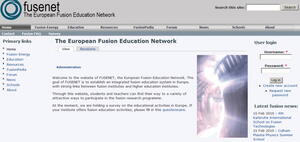Training the next generation
"Nuclear fusion may have a wonderful image as a sustainable energy source," says Niek Lopes Cardozo, "but it has one big drawback: building a fusion reactor is of surpassing scientific and technological difficulty." "And," he adds, "a whole generation of fusion experts is going to retire soon. So if we want to establish fusion as an energy source for the future, we have to train the new generation of engineers and researchers. The good thing about ITER is that it provides a long-term program and clear career perspectives. So students can choose to specialize in fusion and see where this will bring them."
Niek Lopes Cardozo is one of the most prominent ambassadors for fusion research in the Netherlands (see portrait in this issue). Until recently, he was Head of the Department of Fusion Physics at the FOM Institute for Plasma Physics Rijnhuizen, where he was in charge of Dutch research in the field of nuclear fusion (part of the Euratom-coordinated European fusion research program).
In May 2009 Lopes Cardozo made a career switch, when he was appointed as the first full Chair in Science and Technology of Nuclear Fusion at Eindhoven University of Technology. Here he is currently setting up a dedicated Fusion Master curriculum. "The goal of the Fusion Master is to feed the fusion community with the brightest and best-prepared minds," explains Niek. The Fusion Master program presently comprises five courses in fusion physics and two in fusion technology, plus a full year internship in one of the fusion research centres.
The Fusion Master will be launched in September 2011, but students can already follow a fusion "track" within the Applied Physics Master. Already, the program is attracting many students, who are motivated in their choice both because of the challenging science and the desire to use their talents to contribute to society.
"In fact, we see similar initiatives in several European countries, which is a very hopeful sign. It clearly shows the viability of fusion research," sais Niek. Spurred by these developments, 36 partners—universities as well as research labs across Europe—started the FuseNet European Fusion Education Network, which Niek chairs. This coordination program aims at enhancing the fusion training and education activities in Europe, and getting the word out to interested students.
The project received a grant of EUR 2 million from the European Commission, and covers all education levels—from secondary school through Bachelor and Master's level, to PhD, with an emphasis on the Master. The main actions of the projects are: the establishment and running of the FuseNet network; the development of individual learning opportunities and establishment of common educational goals; the joint development of educational materials and hands-on experiments; and the funding of joint educational activities.


